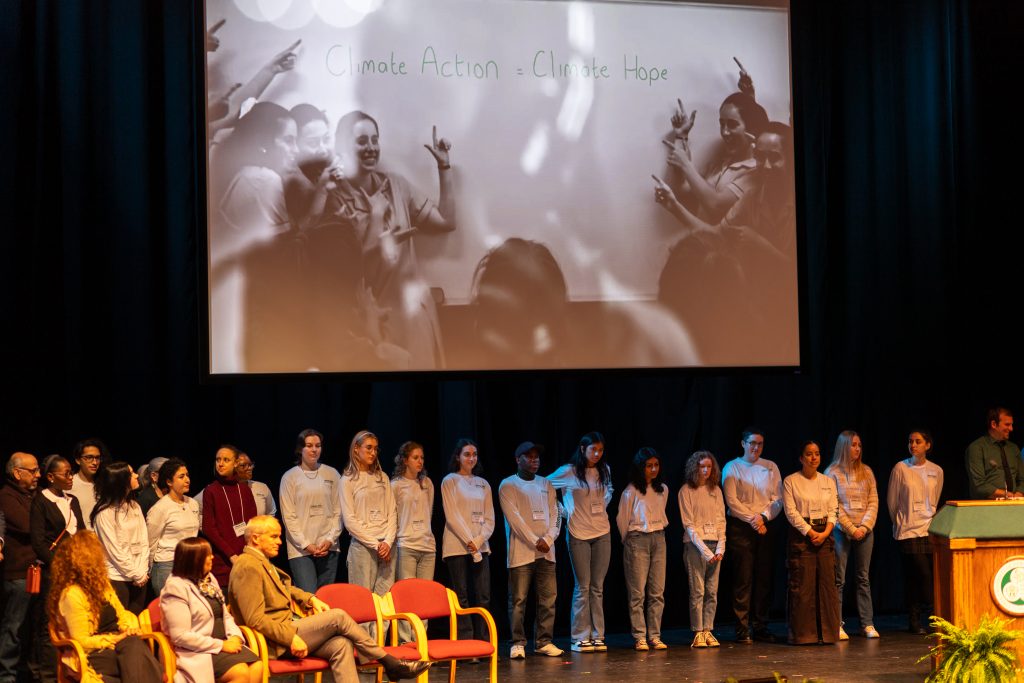On Friday, a coalition of organizations affiliated with Binghamton University launched the 1MReady_Bing initiative in collaboration with 1 Million Women, an environmental advocacy organization based in Australia.
Since its founding by Natalie Isaacs in 2009, the organization, recognized by the United Nations in 2013, has exceeded its goal of recruiting one million women to take climate action in their personal lives. For the BU-centered initiative, one person pledges to make a change in the name of the planet to potentially motivate more people to do the same. Student leaders and faculty hope to create a domino effect powerful enough to impact companies, politicians and governments, starting with a goal of 2,000 students making tangible changes in their everyday lives.
“As we say, our color is green,” University President Harvey Stenger said at the launch event. “But it’s not just our school color. I really think it’s one of our most important values.”
The campus groups involved include the Kaschak Institute for Social Justice for Women and Girls, Binghamton Two Degrees, the Sustainable Communities Transdisciplinary Area of Excellence, the Office of Sustainability, the Center for Civic Engagement and the Common Read Experience.
Andreas Pape, the director of Binghamton Two Degree and an associate professor of economics, described how his team, specifically Martin Lorocca, resource recovery manager for the Office of Recycling and Resource Management, and University Chief Sustainability Officer Pam Mischen, were instrumental in getting 1MReady_Bing off the ground.
“They have led the effort to help organize [Isaacs’s] trip here and the launch of the app,” Pape wrote in an email. “[Loracca], for example, calculated the carbon implications of the actions that users in New York state can take — the carbon implications of electrification, for example, are much different in New York, where much of our electricity comes from renewables relative to Australia.”
Issacs, the Australian Geographic 2017 Conservationist of the Year, was not always a climate champion. She spent 24 years working in cosmetics manufacturing, a chapter of her life she discussed during her keynote address.
“I thought that climate change was somebody else’s issue,” Isaacs said. “I thought that I was one person, and I couldn’t make a difference anyway.”
Her perspective shifted after she tried to substantially reduce her carbon emissions. Since then, she has made it her mission to convince others — especially women — to do the same. She decided to start a women’s movement to create a space focused on the intersection of climate activism and female empowerment, as well as to emphasize women’s economic power. Now, Isaacs is excited to bring the movement to BU, a place she feels strives to make a difference.
Lorena Aguilar, the Kaschak Institute’s executive director, first met Isaacs during her time at the United Nations, where 1 Million Women gained recognition for its work in women’s and climate activism. According to Aguilar, Isaacs’s dream of bringing 1MReady to the United States took 10 years and a lot of determination to fully implement.
Stephen Corbisiero, the president of Zero Hour Binghamton — a student-run environmental justice organization — and a senior double-majoring in environmental studies and geography, said he hopes giving students a way to visualize their progress will allow them to realize making a change is possible, even at an individual level.
“What’s really great about the 1MReady campaign is that it lays all this information out in a simple, easy to follow format,” Corbisero said.



